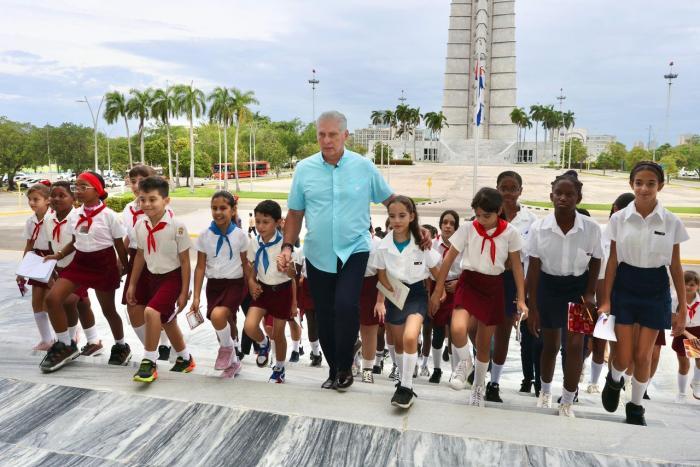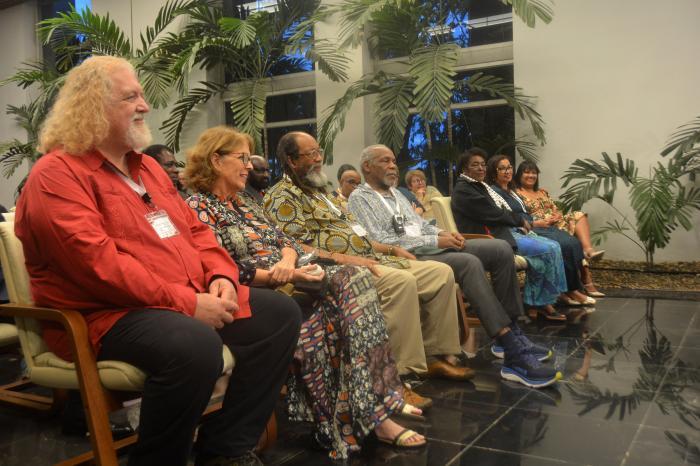

"A meeting like this strengthens us; you have been thanking Cuba, but we have to thank you very much, because you have given us a lot of energy with your participation," said the First Secretary of the Central Committee of the Party and President of the Republic, Miguel Díaz-Canel Bermúdez, to a representation of those attending the International Conference Cuba 2024 Decade for People of African Descent.
The President received, on Wednesday evening at the Palace of the Revolution, guests from 18 countries of North America, Central America, the Caribbean, South America and Africa, and there were interventions, virtual or in person, by the President of the United Nations General Assembly, Unesco, directors of United Nations agencies, the African Union, Caricom and other international organizations.
In the exchange, which was also headed by Inés María Chapman Waugh, Deputy Prime Minister, and Alpido Alonso Grau, Minister of Culture, the Cuban intellectual Rolando Rensoli Medina, coordinator of the Color Cubano Program, paid a special tribute to the American artist Danny Glover Laverne, present at the meeting, who ten years ago, after the declaration by UNESCO of the Decade for People of African Descent, had said that Cuba was the most moral country to develop this kind of meetings.
"And Cuba," Rensoli said, "has thus closed the Decade for People of African Descent with dignity and morality".
The American James Counts Early, retired from the Smithonian Institute and social activist, affirmed that "in Cuba we see something different in our America, because it has been able to promote a path of possibilities, of a new world, with the triumphant Revolution of 1959, which confronted racism, which sowed awareness in the people, mapping the sociological reality of racism."
He thus stressed "the importance of informing the American people of the Cuban model against racism, which is, he emphasized, another legacy of Cuba to America and the world."
Geoffroy De Laforcade, professor of History at Norfolk State University, expressed that "Cuba is the country in the world where he feels most comfortable, because here we talk intelligently and with hope about the future of humanity."
He considered that the International Conference Cuba 2024 Decade for People of African Descent has been "an opportunity for dialogue between authorities, social activists, organizations and communities, which constitutes a different model of improvement and happiness."
The Mexican Sheila Zamudio Beltran stressed that the event has been "an exchange between the African diaspora and its descendants, which has confirmed that the struggle is still alive. The fundamental point here has been - she said - the meeting of people who are talking about how to be treated as people."
The American Colette Pean, founder of the December 12 movement, an organization for the rights of African-Americans, thanked Díaz-Canel, on behalf of her organization, the Cuban people, who "have acted in terms of leadership and a future of resistance."
Diana Hamra Robaina, from Argentina, informed that in her country there are Afro-descendants, and, contrary to what President Milei says, who says that the Argentine nation was formed with ships coming from Europe, it was also formed with those who arrived enslaved in ships from Africa.
In Argentina, he explained, "the Afro-descendant movement is incipient, but it is getting stronger," and he thanked for being at the conference, which has allowed him to interact; and especially Cuba, which is, he said, "a beacon of solidarity, of integration between our countries." "In Argentina -he reiterated-, many people continue to support Cuba, which is a beacon of this continent."
Barbadian David Dennys, secretary general of the Caribbean Peace Movement, commented that "Cuba has represented a movement that defends the poorest people in the world," and called to take the fight against racism to another level, reinforcing the demand for the right of Afro-descendant peoples to receive reparations for having been stolen from Africa and for slavery; especially in historical moments like the present, when fascism is resurgent in countries such as the European ones.
Dorothy Davis and Keya Barron, of the Black Caucus Institute, from the United States, revealed that they had never been to Cuba, and now they have learned much of what their people have done and continue to do, and we have cleared our minds of the misinformation we received about this country.
They asked to continue exchanges of this kind and to expand them. "We, for our part, will share what we have learned here, the new approaches to racism that we have seen here," said Dorothy, whose great-grandfather, she said, participated in the construction of the Cuban railroad in the first decades of the last century.
Nigerian Abdulrahman Abbe Terab, a social activist, stressed that the African Diaspora, especially that of his country, will not be able to work for their rights without Cuba, where in every corner "there is the Nigerian, the Yoruba, there is Changó." "The world has to understand that Nigeria and Cuba not only have similarities, but that they are one people."
Angela Naa Afoley, head of the Diaspora Division in the African Union, recognized the effort made by Cuba in the Decade for People of African Descent, and its contribution to the liberation of several African countries, as well as the sending of medical brigades and other acts of solidarity that have benefited millions of inhabitants of the Mother Continent.
THERE IS NO RACE, WE ARE ONLY HUMAN
The International Conference Cuba 2024 Decade for People of African Descent, at the conclusion of a year that closes that decade, has reaffirmed "the conviction that we share common ideas, a common good, that aspiration that there is a fairer world for all, without distinction, without evaluations, without distinguishing people by whether they have one color of skin or another," said the Cuban President, at the close of the exchange.
"We always start from José Martí's conviction that homeland is humanity, that we are all equal and that there is no race. We are human beings who inhabit this planet, and your presence in Cuba has been very important for us."
The Head of State shared with the attendees details about the complex situation that the Cuban people are going through, which has led to the deterioration of some social indicators. If these are compared with those of many countries, such as Health and Education, they still have a good performance, but -he added- they have been hard hit. However, despite this, he said, we do not lose optimism and we have a strategy to overcome it.
Díaz-Canel expressed the high value Cuba attaches to the fight against discrimination based on skin color, an issue that has a lot to do with feelings, with the spirituality of peoples, of nations.
In this regard, he underscored the legacy of Commander-in-Chief Fidel Castro Ruz, who was a passionate and severe student of the work of Cuba's National Hero, José Martí. And Martí, he recalled, was a man with a humanist thought, a tremendous dimension; and he was one of those who taught us that people could not be distinguished by the color of their skin or other discriminatory reasons.
Thus, he pointed out, since the triumph of the Revolution, Fidel promoted, within the revolutionary work, the elimination of discrimination; discrimination based on skin color in a country that had lived years, centuries, of Spanish colonialism, and later a neo-colonial republic dependent on the United States.
Since the triumph of the Revolution, Fidel -he stressed- was one of those who led, with the continuity of Raúl, social policies to seek equality, equity, inclusion, opportunities for all in a country that had lived all that backwardness of colonization, of racism.
Throughout the Revolution, he reflected, in Cuba we recognize ourselves as equals, we have social policies and laws to combat discrimination, which have given equal rights to promote cultural development, education of any citizen; however, he acknowledged, there are still traces of racism, so that in recent years a national program against racism and racial discrimination has been developed.
The president also addressed Cuba's contribution to the liberation of African peoples, which was, he said, a way of settling that debt we have with our roots. "We feel proud of being descendants of Africans, of being descendants of our indigenous peoples, of being descendants of Europeans."
And always, he stressed, we distinguish that there are values shared by Cubans who come from Africa: courage, rebelliousness, joy, the ability to resist; to defend our roots, of which we are very proud.
"From Africa -he added- we have a rich cultural presence, which distinguishes us, which we share; that is why when we Cubans are there, we feel at home; when we are in the Caribbean, we are at home; when we are in Latin America, we are at home. That is why I believe that we are all brothers."
Related News
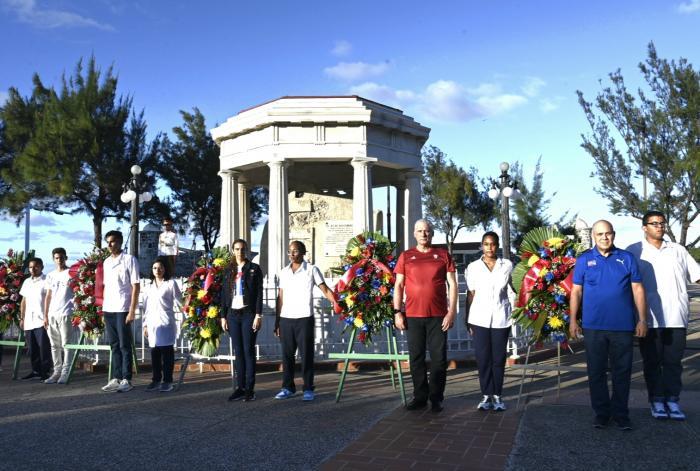
Cuba remembers them and continues defending their innocence
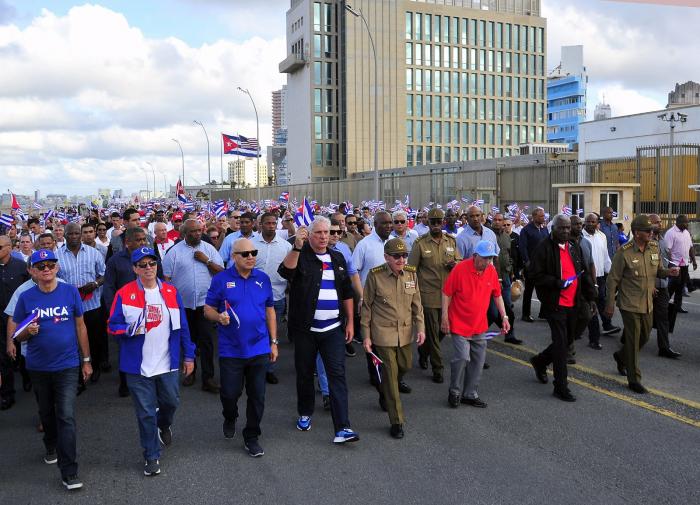
Cuba demands its right to happiness (+ photos)
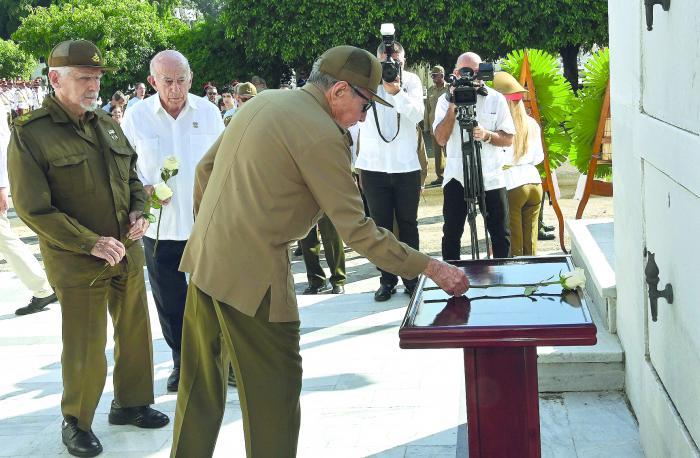
Commander Camacho, an indispensable man of the Revolution
